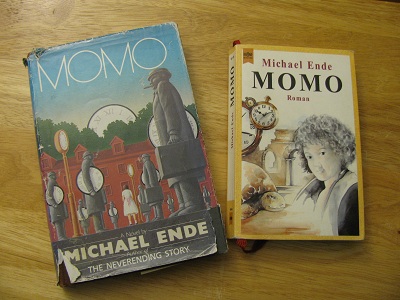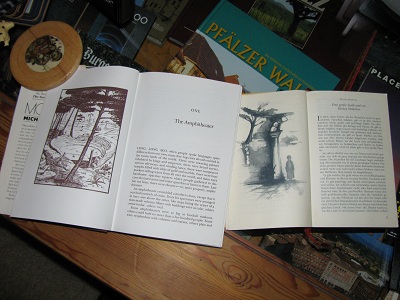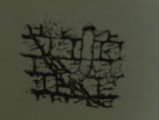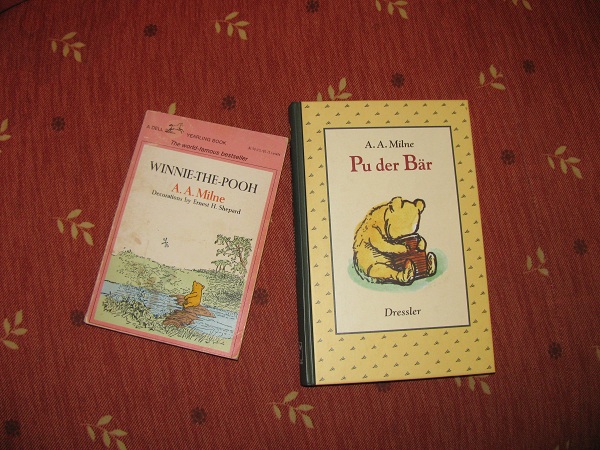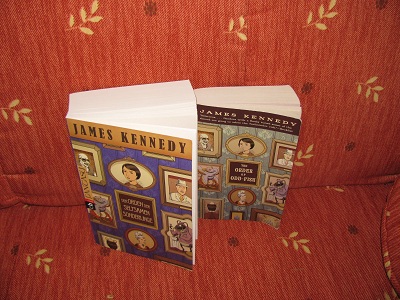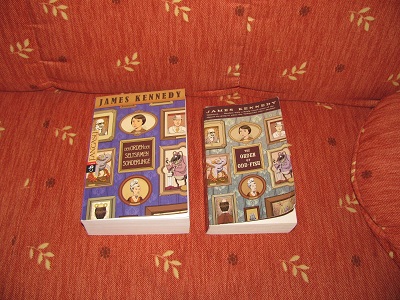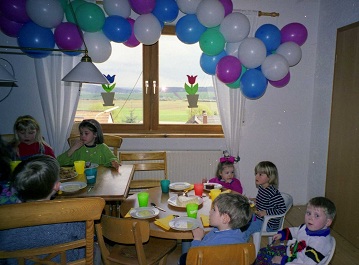Sonderling Sunday – Chapter 11 – Costumed Elephants and Schwenkery
It’s Sonderling Sunday! That time of the week when we play with language by looking at the German translation of children’s books. You do not have to speak German to enjoy these, and you do not have to read the books. In fact, not having done these things might well make the chosen phrases more bizarre, and thus more fun for those of us with a Sonderling sense of humor.
As I’m writing this, I’m about to experience my very first hurricane, and I find it frightfully funny that it is named Sandy. No wonder she is raging — she ALMOST got a really great name! Now, it didn’t happen that Sandy struck Sondy on Sunday, but I do have Monday off. Here’s hoping that the only way Sandy will affect me is to get some extra time off work to read. But we shall see. Anyway, I can stay up late tonight writing Sonderling Sunday and tomorrow sleep late!
This week, we’re back to the original Sonderbook that started Sonderling Sunday, James Kennedy‘s The Order of Odd-Fish, Der Orden der Seltsamen Sonderlinge. We left off on page 124 in English, Seite 158 auf Deutsch.
Some truly useful phrases:
“still in a state of numb shock” = noch immer wie betäubt von dem Schock
“studded with chrome spigots” = mit Chromzapfen gespickt war
“breezed through the room” = fegten aufgescheucht durch den Raum (Hmm. Google translates that translation as “swept scared through the room”)
“a lavishly costumed elephant” = einen prachtvoll kostümierten Elefanten
“stables” = Stallungen
“dazed envy” = gedämpften Neid (“dampened envy”)
Ah! Shorter in German:
“overstuffed chairs” = Plüschsessel
“The Prancing Gobbler!” = Der Stolzierende Schlinghals!
“engaging in rampant Schwenkery” = in schwenkischen Eskapaden ergangen
“as I tossed and turned” = während ich mich in meinen Bett gewältzt (“as I in my bed waltzed”)
“all due respect” = bei allem gebotenen Respekt
“Municipal Squires Authority” = Städtischen Knappenbehörde
“trailed by a group of curious squires” = eine Gruppe von neugierigen Knappen im Kielwasser (“a group of curious squires in her wake” — her “keel-water”)
“snorted” = schnaubte (That’s a good one.)
“frowning at Nora” = schaute Nora missbilligend an (“looked at Nora disapprovingly”)
“earshot” = Hörweite (“hear-far”)
“You look sick.” = Du bist plötzlich so grün im Gesicht (“You are suddenly so green in the face.”)
Now, didn’t you want to know how to say this?
“bristling . . . with claws and spikes and goo-shooting tubes” = mit Klauen und Dornen und Drüsen besetzt ist, aus denen irgendeine Flüssigkeit spritzt
Well, I’m afraid I’m going to have to stop in the middle of a section. I’m feeling strangely dizzy tonight, and I’m guessing it’s a vestibular migraine starting from the extreme low pressure in the approaching hurricane. (Drat that Sandy!) Here’s hoping that I can sleep it off!
Meanwhile, can you use one of these phrases in a sentence? Maybe translate into a different language yet?
As for me, I guess I stopped because ich bin plötzlich so grün im Gesicht. I hope the sounds of the storm won’t have me waltzing in my bed tonight! I will try to sit out the storm tomorrow in Plüschsessel.
Stay safe!

